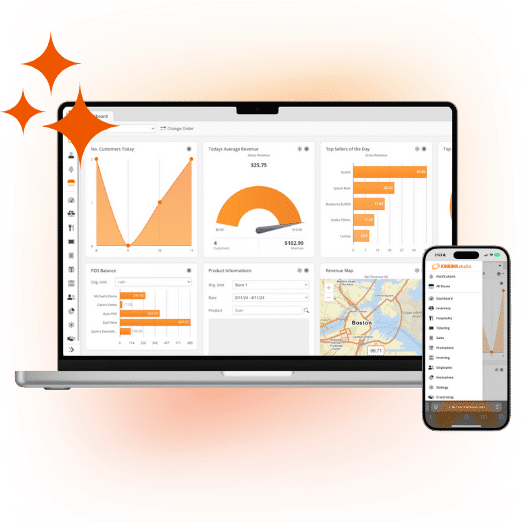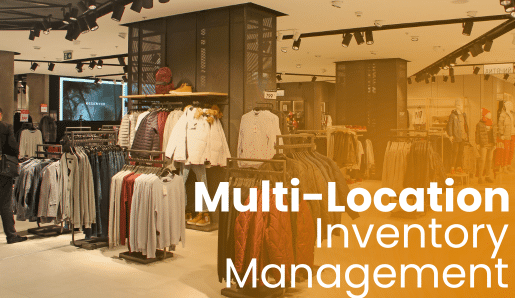Key Takeaways:
- Multi-store inventory management gives retailers real-time visibility into stock across all locations, reducing stockouts and overstock at scale.
- Centralized inventory systems help growing retailers standardize processes while still optimizing inventory per store.
- The right POS software automates transfers, forecasting, and reporting so you spend less time counting and more time selling.
Running multiple stores without centralized inventory is a fast track to sellouts, dead stock, and frustrated staff. Multi-store inventory management solves this by providing a single source of truth across all locations.
In this guide, you’ll learn what multi-store inventory management is, why it matters, and how retailers use modern POS systems to control inventory across locations without adding complexity.
What is Multi-Store Inventory Management?
Multi-store inventory management is the process of tracking, controlling, and optimizing inventory across multiple retail locations from a single system.
It’s closely related to multichannel inventory management, where retailers manage stock across physical stores and online sales channels using unified data
Why is Managing Multi-Store Inventory Important?
As you add locations, inventory mistakes multiply fast. The benefits below show why multi-store retailers rely on structured inventory systems instead of spreadsheets.
Reason #1: Prevents Stockouts and Lost Sales
Without shared inventory data, one store over-orders while another runs out. Centralized inventory systems rebalance stock automatically, a core feature across modern inventory management system types.
Reason #2: Improves Cash Flow
Too much inventory ties up capital and warehouse space. Successful multi-store retailers use shared inventory visibility to invest in fast movers instead.
Reason #3: Simplifies Operations
Managing each store separately creates inconsistent pricing, counts, and reporting. A unified retail management system standardizes workflows across locations.
Reason #4: Supports Smarter Expansion
Inventory data tells you which products scale well to new locations. That insight reduces risk when opening your next store.
Reason #5: Enables Data-Driven Decisions
Multi-location reporting reveals trends single-store data can’t. That’s how retailers plan seasonal buys and promotions with confidence.
Inventory management a headache?
KORONA POS makes stock control easy. Automate tasks, generate custom reports, and learn how you can start improving your business.
How to Successfully Manage Inventory Across Multiple Stores
Managing inventory across locations requires structure, automation, and the right tools. These steps outline a proven framework used by growing retailers.
Step #1: Centralize Your Inventory Database
All stores should pull from a single inventory management database to prevent inventory count and pricing conflicts.
PRO TIP!
If stores run separate systems, inventory accuracy will always lag.
Step #2: Use a Multi-Store POS System
A multi-store POS system syncs inventory updates in real time across locations. This is the foundation of scalable inventory control.
Step #3: Automate Inventory Updates
Manual updates create delays and errors. Modern retail inventory management software updates stock automatically at checkout.
Step #4: Customize Inventory by Store Type
A gift shop doesn’t stock like a winery or thrift store. Retailers benefit from inventory tools built for their vertical, such as gift shops or convenience stores.
Step #5: Track Transfers Between Locations
Inventory transfers should be tracked the same way as sales. This prevents phantom stock and supports accurate reporting.
Step #6: Forecast Inventory Needs
Inventory planning tools use historical sales to predict demand. This reduces emergency reorders and overbuying.
Step #7: Perform Regular Physical Counts
Even automated systems need validation. Scheduled physical inventory counts catch shrinkage early.

Download a Free Inventory Template
Common Challenges and How to Avoid Them
Multi-store inventory challenges tend to scale faster than revenue if systems aren’t aligned. These common issues are well-documented inventory management challenges — and they’re all fixable with the right structure.
Challenge #1: Inconsistent Inventory Data
Using different systems across locations leads to mismatched counts and unreliable reports. Centralize inventory using one platform to eliminate discrepancies, a common issue outlined in broader inventory management challenges.
Challenge #2: Poor Inventory Turnover
Slow-moving stock often goes unnoticed when inventory is spread across multiple stores. Use tools like an inventory turnover ratio calculator to identify underperforming SKUs before excess builds up.
Challenge #3: Overreliance on Manual Counts
Manual counting becomes unmanageable as store count increases. Shift from periodic counts to perpetual systems, as explained in the comparison of periodic vs perpetual inventory systems.
Challenge #4: Shrinkage Across Locations
Shrink increases when loss prevention varies by store or staff. POS systems designed for franchise and multi-location environments standardize controls and reduce risk across all stores.
Challenge #5: Excess Surplus Inventory
Surplus inventory ties up cash and storage space across locations. Identify surplus early and take action using proven surplus inventory strategies to rebalance or discount stock.
Software & Tools for Multi-Store Inventory Management
Multi-store retailers need tools that scale with complexity. The best inventory management software — which includes POS systems — will make scaling a breeze.
Tool #1: KORONA POS
KORONA POS combines inventory tracking, reporting, and multi-location management into a single platform built for retail growth. As a multi-store POS system with cloud-based access, it supports retailers who need real-time visibility without enterprise-level complexity.
Get started with KORONA POS today!
Explore all the features that KORONA POS has to offer with an unlimited trial. There’s no commitment or credit card required.
Tool #2: Standalone Inventory Management Software
Standalone inventory tools focus on purchasing and stock counts but often lack real-time sales integration. As explained in guides to inventory management software, these tools work better for warehouses than for in-store retail.
Tool #3: Retail Management & Operations Software
Retail management software adds reporting and workflow layers but still depends on POS data accuracy. Without tight POS integration, inventory issues persist — a common limitation across retail operations software platforms.
Features to Look For in Multi-Store Inventory Management POS Software
The best multi-store POS systems balance automation with control. These features ensure inventory stays accurate as locations scale.
Feature #1: Real-Time Inventory Sync
Real-time syncing updates inventory instantly after every sale. This prevents overselling and stockouts across locations.
Feature #2: Store-Level Reporting
Store-level reports let retailers compare performance without manual spreadsheets. This supports smarter purchasing and transfer decisions.
Feature #3: Inventory Transfers
Built-in transfer tracking ensures stock movement is recorded accurately. This prevents phantom inventory and reporting gaps.
Feature #4: Cloud-Based Access
Cloud POS systems allow owners and managers to monitor inventory remotely. This flexibility is essential for multi-location oversight.
Feature #5: Loss Prevention Tools
Audit trails and permission controls reduce shrink as operations scale. These features protect margins across every store.
Discover Advanced Analytics and Custom Reports
Speak with a product specialist and learn how KORONA POS can work for your business.
Multi-Store Inventory Management Best Practices
Even the best software needs disciplined processes behind it. These best practices help retailers stay efficient as they grow.
Practice #1: Track Non-Sellable Inventory
Equipment and supplies should be tracked separately from retail stock. This is a core principle of equipment inventory management that prevents reporting distortions.
Practice #2: Use ABC Inventory Analysis
ABC analysis prioritizes products based on revenue impact, not unit count. This helps teams focus on items that matter most.
Practice #3: Plan for Seasonal Demand
Seasonal spikes magnify inventory mistakes. Following holiday inventory management strategies reduces last-minute overbuying.
Practice #4: Align Inventory Across Sales Channels
Retailers selling both in-store and online need shared inventory rules. Multi-channel retailing depends on accurate, centralized stock data.
Practice #5: Standardize Stockroom and Loss Prevention Processes
Consistent stockroom procedures improve accuracy and accountability. Pairing strong stockroom management with retail loss prevention features minimizes shrink as stores scale.
Manage Your Multi-Location Inventory with KORONA’s All-in-One POS System

Managing inventory across multiple locations doesn’t have to mean more complexity. KORONA POS supports automated inventory management with real-time updates, centralized reporting, and tools built for growing retailers.
Take the next step by exploring automated inventory management with KORONA POS or booking a demo to see it in action.











